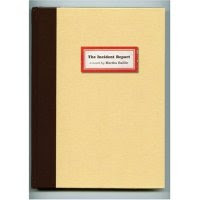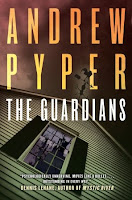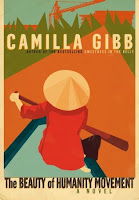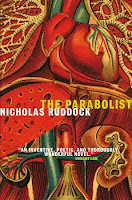I have a huge list of books to get caught up on in terms of keeping track of my reading here in the blog. As I doubt I’ll find the time to create individual posts for every book I’ve read since the beginning of July, I’m going to do one big post here, and then try very hard for the rest of the summer to update here more than once a month.
#24 – Shadow Tag
This was the very first book I read for my new book club. I’d read Louise Erdrich back in university and remembered enjoying Love Medicine very much. Shadow Tag, with its semi-autobiographic overtones and extremely dark subject matter, was an unsettling novel. It’s not even that you can’t trust the protagonist, or that she’s an unreliable narrator; it’s more that both Irene and her husband Gil are truly, completely unlikeable. They lie to one another, feed off each other’s insecurities, have a terrible, damaging relationship, and ultimately aren’t the best parents to their three children. The writing is terrific but I consistently go back and forth on the age-old debate in my head — can I really enjoy a book when I hate the characters? We had an amazing discussion about the novel, about their motivation to stay together, about the destructive nature of art in the book, and about both of their selfish, selfish behavior. It’s an intense novel, be prepared for that should you decide to delve in.
#25 – Freedom
I’m not sure how much to say about Franzen’s latest novel because I read a work galley (well, I begged to borrow a work galley and it’s my ONLY copy) and the book isn’t being published for another few weeks. However, I will say this — it’s a terrifically engaging chunk of a book that follows the lives of the Berglund family. Like The Corrections, Franzen writes so convincingly about American life that it’s impossible not to get emotionally involved in the lives of these characters. It’s an excellent novel.
#26 – I’d Know You Anywhere
The same goes for the new Laura Lippman. She’s one of my favourite commercial fiction writers — her stories are always page-turners and her characters always have issues to overcome that develop into rich, realistic plot lines — you never feel like she sacrifices anything for the story, it’s relentless. Her latest novel is no exception. Eliza Benedict has worked hard to create a very particular kind of life for herself — until the man who abducted her when she was a teenager tracks her down and asks something of her she isn’t necessarily prepared to give. The novel reminded me in a way of Barbara Gowdy’s Helpless in the way it gives a bird’s eye view of not only the victim, but the criminal as well. It’s a captivating novel — perfect for summer reading.
#27 – We Have Always Lived In The Castle
Oh my goodness I adored Shirley Jackson’s macabre, Gothic novel. This was another book club book and what an awesome choice it was. Merricat (Mary Katherine) Blackwood and her sister Constance live in a run-down old manor house with their Uncle Julian. Years ago her entire family was killed by a fatal dose of arsenic-laced strawberries during dinner. Constance, the elder sister, was accused of the crime, and then tried, but found innocent. However, the townspeople have never quite forgiven her, and so Merricat (an 18 year-old who acts far more like a 12 year-old) and Constance have somewhat shut themselves up against the world. That is, until their cousin Charles arrives and throws their world in chaos. It’s a delicious, deceptively simple novel, and we all raved about it at book club. I comped it to the best of Flannery O’Connor with even more edge, if that’s possible.
#28 – Mr. Shakespeare’s Bastard
Richard B. Wright remains one of those Canadian authors, like Jane Urquhart or Michael Ondaatje, that I’ll read anything they write. If they wrote a grocery list, I’d probably read and enjoy it. His latest novel, Mr. Shakespeare’s Bastard, feels like a departure, and that’s not a bad thing. While I loved October, I felt like it had a definite place in the Canadian canon — it was almost as if he was actively trying to write back to Hugh MacLennan. With this new novel, I feel like he’s moved into decidedly new territory. It’s a hybrid kind of novel — one part historical fiction (the book’s protagonist is the bastard daughter of Wm Shakespeare), one part typical literary fiction, and one part juicy page turner. Aerlene Ward has lived her entire life with a secret: William Shakespeare was her father. As she gets on in age, she feels the need to tell her story and enlists the help of Charlotte, the youngest daughter in the manor house where she’s been the housekeeper for all of her adult life. It’s a rich tale — both as its told and as it was lived — and Wright has a keen ear for Elizabethan London. The biggest issue that I have with so much historical fiction is the romance-novel-ness of them all. This book isn’t that, while I can see how it would appeal to the biggest fans of Philippa Gregory, it’s so much richer in how the historical details are integrated into the fabric of the story. These are strong, interesting women, and there’s an apt feminist critique to be explored upon a more educational reading of the novel. Anyway, I’ve got high hopes for this book for the fall — I really want many, many people to love it as much as I did. We’re doing a Savvy Reader read-along post for it that should be live in the next couple weeks.
#29 – The Girl With The Dragon Tattoo
Like the rest of the universe, I finally went back and read the first of Steig Larsson’s ridiculously addictive series. I’m glad I did, if only to fully understand how all three books fit together, and to see how Lisbeth and Blomkvist actually meet for the first time. We watched the film the other night, and I found it almost better than the book — while definitely not as detailed, it was far more streamlined, which I appreciated. As much as I find these great books, great social experiments in how a book can “tip,” sometimes the writing is clunky, the dialogue terrible, and there’s just too much detail. And I enjoyed seeing the Swedish landscape if only to give myself a visual picture to accompany the reading experience in my head. I read this book on my iPad with the Kobo application and found that there were some layout issues with the text that made transitions a little awkward but overall I think it’s the perfect way of reading commercial fiction. It’s not a book that I’m dying to keep — it’s an impulse, something I want to read right now and steam through, and knowing I don’t have to pawn off a physical copy on a friend was a relief.
#30 – The Help
Now, this novel truly surprised me. From the cover, it screams “Oprah” and “Nicholas Sparks,” but because it’s my job to know what kinds of books sell like stink, I figured it would be another good one to try on my iPad. This time, I used the Kindle application, and I found it just that teeny bit superior to the Kobo (mainly in the fact that it gives an accurate idea of where you are in a book), but there’s really little difference between the two as a reading application for the basic stuff that I need (good bookmarks, easy navigation, etc). Annywaaay, The Help. I bawled like a baby by the end of it, found myself reading until 4 AM one night at the cottage when I couldn’t sleep and realizing it’s just a really good novel. Set in Jackson, Mississippi smack-dab in the middle of the Civil Rights Movement, The Help entwines the stories of the young white women who form the “society” of the area with the black women who they consider their “help.” From debate over why separate bathrooms IN ONE HOUSE for the women who feed, clothe, bathe, and raise their children to Miss Skeeter’s desperate ‘Peggy in Mad Men-esque’ quest to get out of her Southern life entirely, the novel keeps you emotionally invested from beginning to end. Stockett writes convincingly from both perspectives and the payoff at the end was impeccable.
#31 – Locavore
When the iBookstore launched at the beginning of July, I bought a few of our books so I could make sure they worked. Sarah Elton’s look at the local food movement from a Canadian perspective had been on my TBR pile forever. I did a lot of work with her when the book first came out and she’s just such a lovely author (but that’s an aside). She has a very easy-going writing style and her way into the topic (from a pink sugar cookie made in China in her daughter’s loot bag) was both personal and intriguing. There were so many things that I didn’t know and so many interesting, new perspectives about the local food issues that Elton puts forth that I learned a lot. How wrong was my assumption that once I’d read Pollan and Kingsolver that there was nothing left to know about the locavore movement. This is a book for anyone remotely interested in the issues surrounding the food we eat — and even if you aren’t, it’s a great primer to get you started. But my favourite part of Elton’s perspective isn’t a holier than thou approach, it’s more “do the best you can; it all helps in the end.” And I feel like this suits my life — we buy local where possible, support farmer’s markets, grow our own veggies, and balance out the more exotic aspects of your eating with better choices. I LOVED this book.
#32 – The Lovers
I have so much respect and admiration for Vendela Vida. Not just because she leads an obviously envious life and is bloody gorgeous, but because she’s an exquisite writer whose craft I covet every time I read a sentence of hers. Yet, this novel disappointed me. It lacked the emotional resonance that reverberated so nicely through Let the Northern Lights Erase Your Name, and the tragic event posited by the jacket copy to “rock” the protagonist, Yvonne, to her core, felt contrived and even stereotypical when looked at in context. It felt very Hollywood, this novel, and maybe I was just expecting too much from Vida because I pushed her earlier book on every single person I know. So, in short, Yvonne, a middle-aged widow, visits Turkey, the site of her honeymoon, to try and figure out how to move on with her life. She’s had a good life, but one with issues, and she starts to unravel the more time she spends trying to ‘find’ herself in relation to who she once was: mother, teacher, wife. The setting, at once meant to invoke her past and perhaps spurn Yvonne into a sense of self-discovery, becomes exotic and strange to her. And then, things start to go very awry when she befriends a young Turkish boy visiting his grandmother. There could have been such a rich palette to explore so much in the book but Vida doesn’t drift beyond the superficial in a way. You never truly feel like you know Yvonne, and maybe that’s on purpose, but the whole novel felt incomplete to me, especially the ending.
#33 – Secrets of Eden
And, again, here’s another of my favourite novelists with new books that fell short of my expectations. I adore Chris Bohjalian’s books — even his critical misfires work for me, unlike many, many reviewers, I really liked the trippy nature of The Double Bind and didn’t even mind his last book, Skeletons at the Feast despite its truly awful cover. But Secrets of Eden, well, it failed to impress either with the moral premise underneath the story or by its storytelling. Like in Vida’s novel, the “twist” at the end felt very much like an M. Night Shyamalan film — far, far too apparent from too early on and really quite stereotypical for my tastes. The whole book felt like a Law and Order episode but without any convincing or interesting characters. I find the complex nature of religious characters in novels interesting — but I’ll turn to Marilynne Robinson when I want to explore it in more depth — Bohjalian used it to very obviously pit “good” against apparent “evil” and in this case it didn’t work. Oh, the plot, right: a reverend loses a member of his flock, a woman who had been abused by her husband, and becomes accused of the murder when she and said partner are found dead the morning after her baptism. Enter a very famous writer who has made plenty of money writing about angels. They become involved, which, of course, casts even more suspicion on the poor Reverend Stephen Drew. Yawn. Yes, I know, I’m being sarcastic, but the book was truly tedious in places. Anyway, nothing will stop me from reading Bohjalian, because I adore his fiction, but this just wasn’t the book for me.
#34 – The Big Short
Wow, was this a dynamo of a nonfiction book. Michael Lewis examines the financial crisis in such a detailed and fascinating way that it’s impossible NOT to think of the yahoos on Wall Street as crooks by the end of it. While the book has a LOT of technical jargon as it relates to the financial markets, it’s not remotely dry. In fact, it’s just the opposite — it’s utterly riveting and totally fascinating. He breaks down the few characters who managed to short the crisis even before it began, including a hedge fund owner whose driving characteristic is his Asperger’s, along with a few “outsider” funds who actually took the time to investigate the market and pull it apart at the seams — primarily to find the ways of making huge amounts of money from what they could see coming: a total collapse of the system. It’s incredible that the US government propped up the big investment houses, essentially rewarded them for their stupidity, and then they turned around and rewarded themselves with huge bonuses, and, well, got to all keep their jobs. Billions upon billions of dollars with hidden paper trails and bad trades are lost, unknown or hidden from the general public, just so we can keep the illusion that the big investment banks actually had any idea of what was happening. I’d highly recommend this to anyone remotely interested in why the US is such a mess these days — it’s just utterly captivating and you will shake your head in amazement that not a single person stopped the madness before it all collapsed. Anyway, it’s a great, great read.
Whew. That’s about it — I’m sure there are a couple of books that I’ve probably forgotten but that’s about the extent of my summer reading so far. I’m so behind in my reading in general this year that it’s nice to just have a big stack of books out of the way before the insanity of the fall creeps up on us.
 Sometimes, there’s a clear reason how and why books end up on my shelves. Mainly they’re inherited from friends in publishing, rarely they are gifts, and often they are books that I’ve purchased for some reason or other. But when the time comes to actually reading and reviewing them, I can’t remember the impetus — the review, the award nod, the discussion — that precipitated the book collecting dust over the months and months it lingers on my shelves. Such is the case for Martha Baillie’s The Incident Report. I know it was long-listed for the Giller in 2009, and the Globe review must have intrigued me, but having never read The Shape I Gave You (it’s on the shelf; don’t worry, and I know exactly where it came from), I’m surprised I’d have two books by one author unread…usually I’ll at least try to read something by an author before buying another work.
Sometimes, there’s a clear reason how and why books end up on my shelves. Mainly they’re inherited from friends in publishing, rarely they are gifts, and often they are books that I’ve purchased for some reason or other. But when the time comes to actually reading and reviewing them, I can’t remember the impetus — the review, the award nod, the discussion — that precipitated the book collecting dust over the months and months it lingers on my shelves. Such is the case for Martha Baillie’s The Incident Report. I know it was long-listed for the Giller in 2009, and the Globe review must have intrigued me, but having never read The Shape I Gave You (it’s on the shelf; don’t worry, and I know exactly where it came from), I’m surprised I’d have two books by one author unread…usually I’ll at least try to read something by an author before buying another work.






